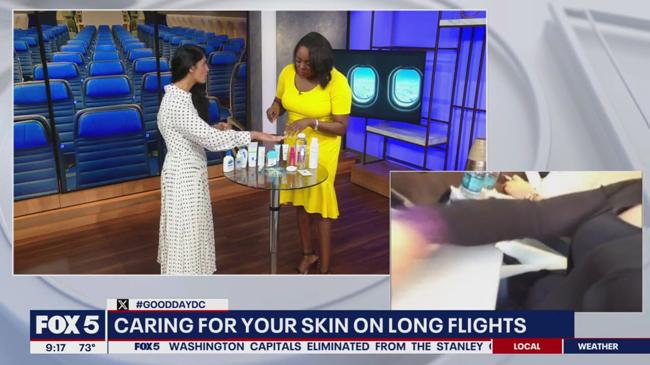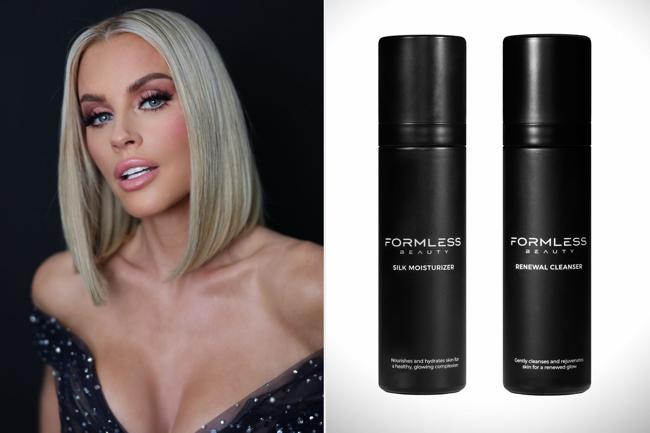Summary
GWU Associate Professor of Dermatology Dr. Pooja Sodha joined Good Day DC to talk skincare on flights.
Source: FOX 5 Washington DC on MSN.com

AI News Q&A (Free Content)
Q1: What are the main skin challenges faced by travelers on long-haul flights, and what scientific explanations are there for these effects?
A1: Long-haul flights expose passengers to low humidity (often below 20%), recycled air, and increased cosmic radiation at high altitudes, all of which can dehydrate the skin, lead to increased transepidermal water loss, and cause skin barrier disruption. Studies confirm that the dry cabin environment exacerbates skin dryness and irritation, making moisturization and hydration essential during flights.
Q2: What evidence-based skincare steps are recommended by dermatologists for maintaining skin health during long-haul flights?
A2: Dermatologists recommend cleansing the skin before boarding, using a gentle, hydrating moisturizer, applying sunscreen even during daytime flights due to UV exposure through windows, and drinking plenty of water. Avoiding alcohol and caffeine, which can further dehydrate the skin, is also advised. Sheet masks and facial mists with hydrating ingredients can provide additional moisture during the flight.
Q3: How do synthetic cosmetic ingredients compare with natural ingredients in terms of safety and efficacy for skincare during flights, according to recent research?
A3: Recent research highlights that natural ingredients, such as algae-derived antioxidants, offer anti-inflammatory and protective benefits without the potential health risks associated with certain synthetic chemicals. For example, Malaysian algae species have demonstrated significant antioxidant and anti-inflammatory properties, which can help combat skin stress during flights. Synthetic ingredients, especially those with known allergenic or irritant potential, should be avoided when possible, especially in the dry and sensitizing environment of an airplane.
Q4: What are the latest trends in travel skincare products, and how are they addressing the unique challenges of in-flight skin health?
A4: The latest trends in travel skincare emphasize products that are multi-functional, hydrating, and formulated for sensitive skin. Brands are increasingly developing travel-sized products with ingredients like hyaluronic acid, ceramides, and marine extracts that help retain moisture and support the skin barrier. Eco-friendly packaging and formulations free from synthetic fragrances, parabens, and sulfates are also trending to cater to health-conscious travelers.
Q5: What role do antioxidants play in skincare for travelers, and what are some scientifically validated natural sources of antioxidants for in-flight use?
A5: Antioxidants play a crucial role in protecting the skin from oxidative stress caused by cabin pressure, radiation, and environmental pollutants encountered during flights. Recent studies have identified marine algae, such as Sargassum and Kappaphycus species, as potent sources of antioxidants like fucoxanthin and idebenone metabolites. Incorporating these natural antioxidants into skincare routines can help reduce inflammation and support skin resilience.
Q6: Which recent scholarly article provides new insights into the cosmeceutical potential of marine algae for skincare, and what are its key findings relevant to flight skincare?
A6: A 2023 study published in the Journal of Cosmetic Dermatology examined Malaysian algae's cosmeceutical potential, finding that Sargassum sp. and Kappaphycus sp. contain antioxidants and anti-inflammatory metabolites beneficial for skin protection. These findings are particularly relevant for flight skincare, as the compounds can help counteract dehydration and irritation associated with air travel.
Q7: How does increased radiation exposure at aviation altitudes impact skin health, and what protective measures can travelers take?
A7: Research has shown that exposure to cosmic radiation increases at aviation altitudes, potentially causing DNA damage and accelerating skin aging. While the radiation dose for occasional travelers is low, frequent flyers and crew may be at higher risk. Protective measures include using broad-spectrum sunscreen, antioxidants in skincare, and physical barriers like clothing to minimize UV and radiation-induced skin damage.
References:
- Skin care - Wikipedia: https://en.wikipedia.org/wiki/Skin_care





